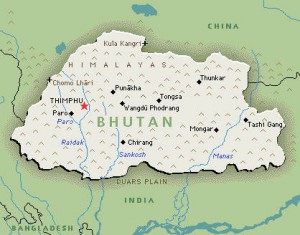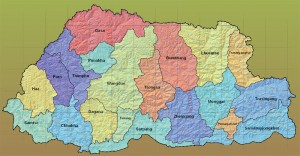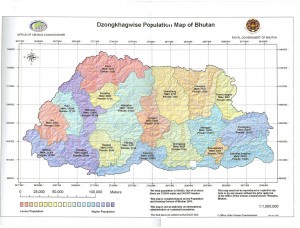Date: November 19, 2009 (6:30 GMT)
Dear Parliamentarians,
On the eve of the 4th session of the first Bhutanese parliament, we want to put forth the immediate concern of the Bhutanese people both inside the country and in exile. The historical importance of your deliberations will be judged by the historians as well as by the Bhutanese people. It is important to bring some of the pertinent issues to discussion before it is late.
On the eve of the 4th session of the first Bhutanese parliament, we want to put forth the immediate concern of the Bhutanese people both inside the country and in exile. The historical importance of your deliberations will be judged by the historians as well as by the Bhutanese people. It is important to bring some of the pertinent issues to discussion before it is late.
A state comprises of the people, the land, a government and sovereignty. In absence of any of these, the state ceases to exist. The land has a fixed border. The people belong to the state as state belongs to the people. In case of Bhutan, however, the border is constricting and the citizens are expelled from country to statelessness. The authority is in the hands of a few people, who are neither able to fend off external pressures and prevent incursion, nor are they able to appease the people inside.
This letter aims to draw the attention of ‘you’, the elected representatives of a sovereign parliament to some of the crucial issues that need your intervention.
Before proceeding into other issues, we urge you to deliberate on the issues of people, country, king and the sovereignty. You, the present parliamentarians, who should be responsible for the welfare of the people, integrity and sovereignty of the nation should also correct the mistakes and iniquitous deeds of the past governments and lay foundation for a friction free future for Bhutan and the Bhutanese people.
People and Democracy
The people of Bhutan chose to come together and stay united under the leadership of one man- Sir Ugyen Wangchuck to avert the then prevalent forces of colonization. A unitary leadership was necessary to consolidate political unity and maintain regional stability in a country torn apart by political feud and civil wars. After the WW1, Bhutan chose neutral position which led to self isolation. Bhutan’s isolation that time was a necessity born of insulating the country against the colonizers. After the WW2, the voices of democracy began to be heard. In Bhutan, the wake up calls for democracy rang as early as 1950s. Bhutan may have escaped from becoming a colony but it could not immunize itself against the wave of ‘democracy’ that swept the subcontinent at that time. Although the voices were brutally silenced, some reforms did follow the event; parliament was started, judiciary system appeared, slavery system was abolished and many positive developments took place.
The people of Bhutan chose to come together and stay united under the leadership of one man- Sir Ugyen Wangchuck to avert the then prevalent forces of colonization. A unitary leadership was necessary to consolidate political unity and maintain regional stability in a country torn apart by political feud and civil wars. After the WW1, Bhutan chose neutral position which led to self isolation. Bhutan’s isolation that time was a necessity born of insulating the country against the colonizers. After the WW2, the voices of democracy began to be heard. In Bhutan, the wake up calls for democracy rang as early as 1950s. Bhutan may have escaped from becoming a colony but it could not immunize itself against the wave of ‘democracy’ that swept the subcontinent at that time. Although the voices were brutally silenced, some reforms did follow the event; parliament was started, judiciary system appeared, slavery system was abolished and many positive developments took place.
At the time when Berlin wall was being deposed and USSR was cracking into fragments, the call for democracy was resonating in Bhutan. Many people may link these global changes to be the catalysts of political unrest in Bhutan. In reality, it was Bhutan’s own political misadventures and its unfriendly treatment of its citizens that turned the country into a political ferment. People’s voice was silenced again using brute force. The people who professed and supported democracy were killed, imprisoned or deprived of rightful living in the country. Worst of all, political and human rights activists were punished through eviction and in a demonic manifestation of brutality, their family members were coerced to leave country at gunpoint. Each one of you is an eye witness to the scene. The wounds are fresh and the scars are yet to appear. The rulers in order to secure their position in the power blotted out the political opponents from the country systematically. When the pressure on the rulers and the government was mounting from all directions, face saving strategy was chalked out. Democracy was ‘proclaimed from the palace’ instead of being ‘declared by the Bhutanese people’. The same people who were accustomed to and benefited from the autocratic system and were against democracy were retained to facilitate old ways in new system. Thus Bhutan’s political machinery retains the former attitude and tries to control everything by force of authority, inherited from the earlier regime. The people who advocated for democracy are still excluded. Not a single opponent has been allowed to participate in the said democratic process. The farce democracy and all of you are used as a cordon to avert the pressure from outside; no mistake and misdeed was corrected.
Country
The constitution which has pages of description of flag and emblems lacks any schedule on map and border of the country or the country itself. The flags and emblems are more flexible to change than the land. Article 1, part 3 of the constitution mentions that “The international territorial boundary of Bhutan is inviolable and any alteration of areas and boundaries thereof shall be done only with the consent of not less than three-fourths of the total number of members of Parliament”. By accepting the constitution parliament is made responsible authority to decide on Bhutan’s international boundary and parliament is the embodiment of Bhutan’s sovereignty. Thus the responsibility of securing the border lies with the parliament and the elected parliamentarians.
The constitution which has pages of description of flag and emblems lacks any schedule on map and border of the country or the country itself. The flags and emblems are more flexible to change than the land. Article 1, part 3 of the constitution mentions that “The international territorial boundary of Bhutan is inviolable and any alteration of areas and boundaries thereof shall be done only with the consent of not less than three-fourths of the total number of members of Parliament”. By accepting the constitution parliament is made responsible authority to decide on Bhutan’s international boundary and parliament is the embodiment of Bhutan’s sovereignty. Thus the responsibility of securing the border lies with the parliament and the elected parliamentarians.
At first look at the map of Bhutan that we all learnt in our school days, the map of Bhutan used in the publications of United Nations. There is a rhino horn shaped protuberance on the northern border where the nation’s highest peak and the pride of the country, the Kula Kangri crowns the country.
Then look at the new map of Bhutan, used in the new government’s portal- the rhino horn shape of the north looks amputated or truncated. We have observed painfully though, that none of you parliamentarians have questioned the use of a faulty map by the Election Commission, to determine the different election constituencies in the country. All of you belong to the class of highly educated elites of the country, but none of you dare to remember the shape and size of the country that you studied since your elementary schools. But the elected members must not miss the talk on national border. Territorial integrity is always a prized possession for every Bhutanese.
China, which shares border with us in the north has not included this area in its map until recently. Where did the land go? If true, Bhutan has created a ‘no man’s land’ out of its own land. Bhutan had dispute over the border and has ongoing talks with both the neighbors. China has been respectful on the treaty on Maintenance of tranquility and peace in Sino- Bhutanese border areas signed between the two countries in 1998. The land has become no man’s land and you, the elected members who are directly responsible to the issue are quiet.
In the earlier Sino-Bhutan border talks Indian representative(s) used to be present. Obviously, India is not happy with Bhutan for its direct involvement in the Sino-Bhutan talks. The Sino-Bhutan border talks after 1990 began to end in lavish gift exchange ceremonies but not in driving results. Outcomes of the meeting, if at all, are quickly buried under the carpet. News sources have reportedly mentioned that in order to pacify India, the government of Bhutan has offered to cede one of the southern districts to India. A noted Indian Professor Mahendra P Lama has published in the journal “Protracted Refugee Situations: Political, Human Rights and Security Implications” (November 2008) edited by Gil Loescher, James Milner, Edward Newman and Gary Troeller and Published by United Nations University leaks the information about Bhutan’s offer of land to India.
The country’s land, the sovereign authority over which lies with the people, is used as gift with a wrong motive, without the knowledge of the people. It is very strange that you elected parliamentarians are not awakening to this reality. No element should be allowed to sell the land or exchange for a gift. You, the present parliamentarians are directly responsible for accepting this faulty map of Bhutan. You must create a new schedule in the constitution to include the map of Bhutan with specification of border.
Although the earlier parliamentarians were either un-lettered or were considered less literate, they were able to quiz the king’s ministers and could keep their concern correctly and timely, though several of them had to risk their life. You, the people elected representatives with varsity certificates and people’s support are not able to speak of the people and of the country. In fact you have spoken nothing besides praising the kings. It is unfortunate that you have not performed to the expectations of the public. You are still the king’s henchmen in disguise. It is hoped that you begin to speak only truth and necessities here after.
King
Monarchy has been a powerful institution in Bhutan for over a century. While securing power and privileges for itself, it has more than often fallen short of duty. The institution of monarchy has resorted to divide and rule policies. The king for long time had misunderstood democracy and rejected its import to Bhutan. Today the word ‘democracy’ is used to fool the outside world.
Monarchy has been a powerful institution in Bhutan for over a century. While securing power and privileges for itself, it has more than often fallen short of duty. The institution of monarchy has resorted to divide and rule policies. The king for long time had misunderstood democracy and rejected its import to Bhutan. Today the word ‘democracy’ is used to fool the outside world.
The era in which lives of people depended on the mercy of rulers has vanished gone from most parts of the world and will soon end in Bhutan too. Now the continuity of the institution of the monarchy depends on the mercy of the people. In context of Bhutan too, the future of this institution depends on the activities of the present rulers. It depends on their role whether they want to remain a pious symbol of sovereignty and national unity like in England and Japan; or choose to be guillotined like the regals of France, or get removed from the scene like the king of Nepal.
You must inform the present monarch correctly that the original advocates of democracy and human rights are redressing their punishments given by the former regime, either in prisons in Bhutan or in exile. Their only mistake was their demand for democracy. The future of Bhutan and her image in the international arenas depend on these people and so is the future of the monarchy.
Abuse of Parliament
Being elected parliamentarians, it is your obligation to meet public expectations and deliver results that will benefit the constituents. You are expected to uphold values of democracy and political stability in Bhutan, not the other way round. The half a century old struggle for democracy by the people is nowhere acknowledged. You are seen working to hide the misdeeds of the previous regime. Instead of cultivating democracy, you parliamentarians religiously proclaim that “democracy is the gift from the King”, which, in itself defeats the drum beat that is going on in the name of this democracy. Your prayers praising the kings right from national assembly of Bhutan to United Nations’ General Assembly insult the martyrs who sacrificed their lives for democracy; and offend the spirit of the hundreds of thousands of people who are suffering in prisons and in exile.
Being elected parliamentarians, it is your obligation to meet public expectations and deliver results that will benefit the constituents. You are expected to uphold values of democracy and political stability in Bhutan, not the other way round. The half a century old struggle for democracy by the people is nowhere acknowledged. You are seen working to hide the misdeeds of the previous regime. Instead of cultivating democracy, you parliamentarians religiously proclaim that “democracy is the gift from the King”, which, in itself defeats the drum beat that is going on in the name of this democracy. Your prayers praising the kings right from national assembly of Bhutan to United Nations’ General Assembly insult the martyrs who sacrificed their lives for democracy; and offend the spirit of the hundreds of thousands of people who are suffering in prisons and in exile.
The 4th session of the first elected Bhutanese parliament could be yet another opportunity for you to mend fences. You should use this opportunity to:
– clarify what has happened to the land in north; and if necessary calling on the government to work towards restoring Bhutan’s northern border to its original position;
-include a schedule in the constitution to describe Bhutan, its territorial extent and international border;
– confirm and if found true take back the offer of a southern district as a gift to India;
– reinstate all the Bhutanese people from exile to their original status;
-release all the political prisoners;
-keep the kings and judiciary confined to respective duties of their position.
If you cannot do all these urgent works, you must accept your failures and resign immediately. If not, be prepared to face the people’s verdict in the days to come. People will never excuse those who support the sell and cede of land and eviction of fellow citizens.
We urge you to take up actions beginning from the 4th session of the parliament.
On behalf of the concerned people
Govinda Rizal, Uji Shi, Okubo Machi, Postal code: 611-0033 Kyoto Japan. Phone: 0081 80 3812 9610, Email: govindarizal@gmail.com
T.P. Mishra, New York, USA.
Deo Maya Giri, 1807, A. Santa Clara, Alameda, CA 94501, California.
Rajen Giri, 1807 Santa Clara AVE Alameda CA 94501, USA.
Naresh Subba, 1710 Franklin Avenue, Apt 2, Kent, OH 44240, USA. Ph. (330)-931-4157 (home), (330)-672-0092 (work)
Ganesh Subedi, 1130 Regent street # B, Alameda CA-94501, United States of America. E:mail: subediganesh@hotmail.com , Tel: 510-326-0804.
Ram Bahadur Chhetri, Pijnacker Hordijkstraat 44, 2593 HE The Hague, The Netherlands.
Santi Ram Poudel, 1277 Cove Avenue, Apartment 208 Lakewood, Ohio, 44107 USA. Telephone- 216-228-2461 (Home), – 216-374-3577 (Cell).
Bikram Adhikari, 1 Wellington St, KIemzig, SA 5087, Australia. Phone: 61-8-72256077
Jeetan Subba, Beldangi II, Jhapa Nepal.
Vidhyapati Mishra, EPC 2377, Kathmandu, Nepal, Phone:+977-9841 869725 Email: vidhyapati@yahoo.com, Website: www.bhutannewsservice.com
Puskar Sharma Poudyal, 38/16 crozier TCE,Oaklands Park,SA 5046, Australia. mob:0421704709
Tek Nath Mishra, 3127 Pleitner Ave, Oakland,CA USA.
Nanda Gautam, Post box 120, 5280 AC Boxtel, The Netherlands.
Parsuram Sharma Luital, 133A south St, Hadfield 3046, Melbourne Victoria, Australia.
Rajani Basnet, Via Botticelli 3 , 40036 , Monzuno, Italy. Email: lisrah@gmail.com
Sushil K Niroula, 38/16 Crozier Tce, Oaklands Park, SA 5032.
Mohan Subedi, Email : monsubedi@gmail.com, Address: Adelaide, SA, Australia.
Ramesh Gautam, Fjellvegen 46, 5563 Førresfjorden, Tysvær Kommune. Norway. E-mail: rashu_re96@yahoo.com
Bhim Lal Bastola, 3154 Lapland Dr, Cincinnati, OH 45239.
http://apfanews.com/opinion/an-open-letter-to-the-bhutanese-parliamentarians.html



No comments:
Post a Comment